Of course, there are also spectacular celebrations such as the Orthodox Easter and cultural festivals a gogo. From sombre to downright riotous, you are never far from a festive occasion in Greece – the following top five are certainly worth planning your trip around.
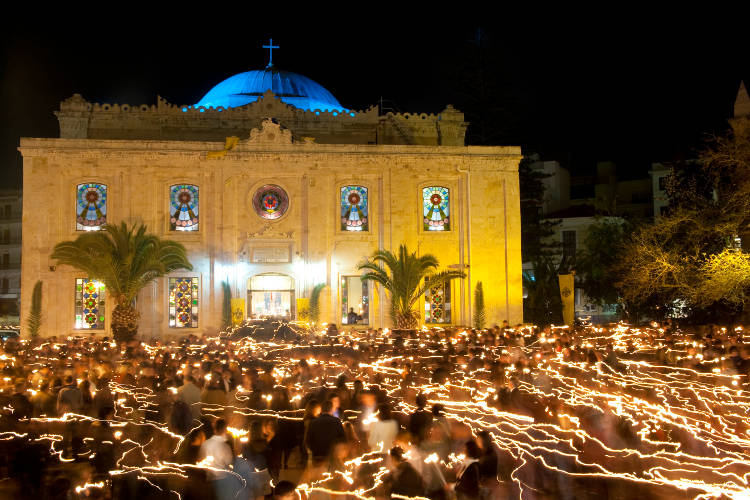
Easter is by far the biggest event of the year, celebrated everywhere with candlelit street processions, midnight fireworks and spit-roasted lamb. Some islands are renowned for their unique Easter festivities.
Easter week, or Holy Week, is marked by different events each day. It all begins on the Saturday of Lazarus (one week before Easter Sunday) with children going door-to-door singing the hymn of ‘Lazaros’ and collecting money and eggs. The festive spirit continues throughout the week, and villages, towns and cities come to life as locals decorate their churches and epitaphs, hold daily services, fast and follow specific customs.
Good Friday leads into Easter weekend with a day of mourning in recognition of the death of Christ, culminating in one of the most extraordinary nights of Easter week. Evening services are followed by candlelit processions through the streets, carrying the flower-decorated epitaphios (bier of Christ) and representing Christ’s funeral. Bands, cantors, clergy, women bearing myrrh, altar boys with liturgical fans, and townspeople singing hymns all join the solemn cortege. Along the route, people holding candles scatter flowers and perfume on the epitaphios. One of the most impressive of these processions climbs Lykavittos Hill in Athens.
Resurrection Mass (Anastasi), which takes place on Saturday night, is without a doubt the most important religious event of the year. At midnight, all lights are extinguished in the church and the priest uses his candle to light the Easter candle of a parishioner. The flame passes from candle to candle, light fills the church, and the moment of the resurrection is marked by kisses and greetings of ‘Christos Anesti; Alithos Anesti’ (Christ has Risen; Indeed he has Risen). Afterwards, families go home and break their Lenten fast with a rich meal of traditional dishes and the fun ritual cracking of vibrant red-dyed eggs.
Easter Sunday is the day for celebration and feasting with lamb roasts and jubilation. It’s an excellent time to get invited to a Greek home. The leisurely midday meal on flower-draped tables often gives way to traditional dancing and fireworks. As an important place of Christian pilgrimage, the Monastery of St John the Theologian on Patmos has one of the largest celebrations.
If you’re planning a trip to Greece for Easter, remember: the date of Greek Orthodox Easter is tied to the Julian calendar, so it won’t necessarily match up with Catholic Easter, which is calculated using the Gregorian calendar.
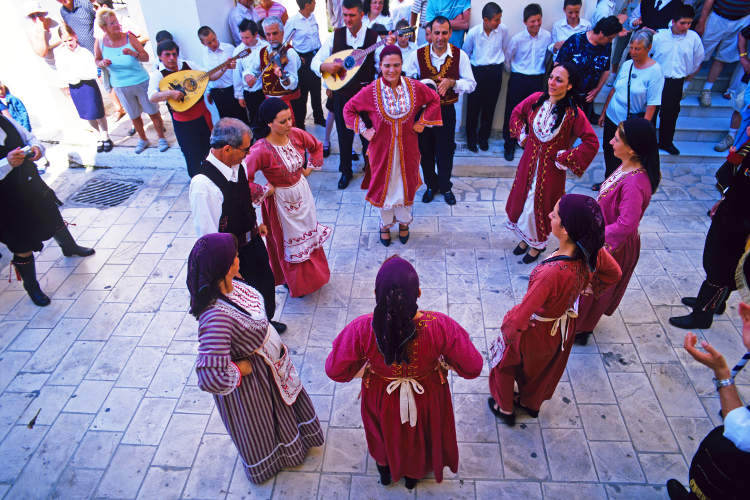
Some say that Carnival the world over has its roots in Greece’s ancient worship of wild, wonderful Dionysus, the god of winemaking, fertility and theatre. Today, Greece’s Carnival season is related to the Greek Orthodox religion, and kicks off three weeks prior to the fasting of Lent (from mid-January to late February or early March). A host of smaller events leads up to the wild weekend of Carnival – known in Greece as Apokreas – which is resplendent with costume parades, colourful floats, feasting and traditional dancing. At Apokreas even small villages eat, drink and don (sometimes off-colour) costumes and parade in the streets. The celebrations end with Clean Monday (Kathara Deftera), the first day of Lent, which sees families go on picnics and fly kites.
Each region has its own take on Apokreas. Head to Patra in the Peloponnese for the biggest and wildest celebrations. Skyros in the Sporades sees entire towns dressed as goats, copper bells and all. Rethymno in Crete celebrates with a bit of a Venetian flair. If you’re planning a trip, check the calendar: each year the date of Apokreas is different.
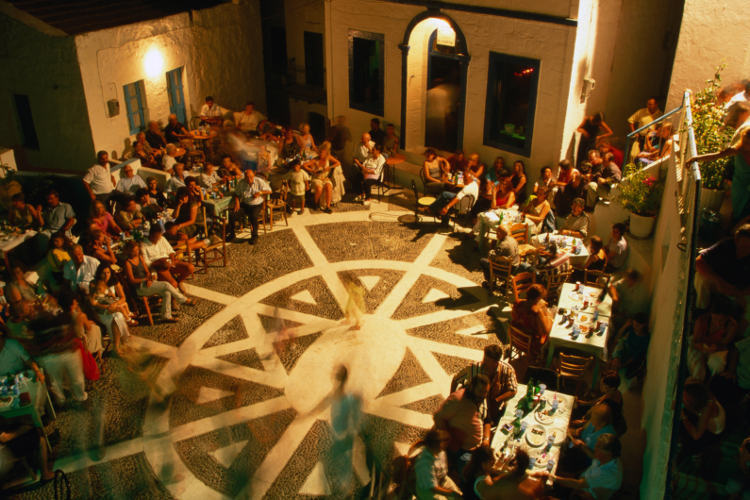
Imagine the open, dark Greek summer sky overhead and the marble tiers of an ancient Greek theatre filled with a rapt audience watching art in the making. The most prominent Greek summer festival, the Hellenic Festival features a top line-up of local and international music, dance and drama. And, wonderfully, many of the marquee events are staged at one of the world’s prime historic venues: the ancient Odeon of Herodes Atticus in Athens, with the floodlit Acropolis as a backdrop.
The other key venue is the Unesco-listed Theatre of Epidavros, two hours west of Athens near Nafplio in the Peloponnese. The amazingly well-preserved theatre, which saw its first performance around 2000 years ago, has perfect acoustics and occupies a glorious setting amid pine-clad hills. Other events are also held in modern venues around Athens. The festival runs from June through August.
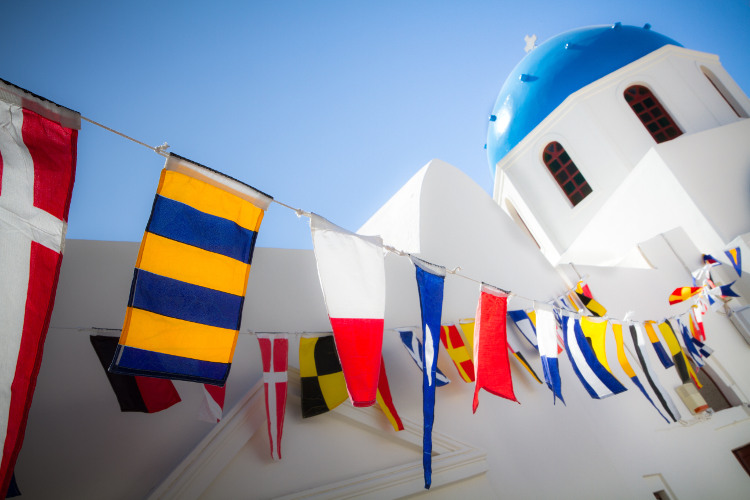
Celebrating Greece’s long relationship with the sea, fishing villages and ports throughout the country host historical re-enactments and parties in late June. Navy Week in Crete honours the island’s maritime tradition with music, dancing, swimming and sailing; celebrations are especially big in Soudha, near Hania. In Hydra, the Miaoulia festival celebrates local naval hero Admiral Miaoulis and the Hydriot contribution to the War of Independence. It culminates in a spectacular sound-and-light show with the burning of a boat which represents a Turkish warship, and fireworks over Hydra harbour. In Lesvos (Mytilini), Molyvos and Kaloni see lively celebrations as well.
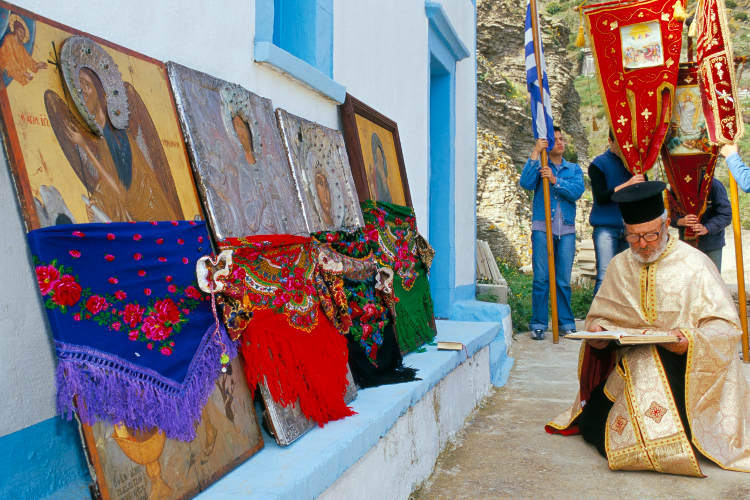
Considered the brightest and most beautiful moon of the year, the August moon inspires towns across Greece to host special nighttime events and parties. In Athens, stunning historical venues such as the Acropolis or Roman Agora open for free moonlit performances of theatre and dance. Each year the program changes, so check locally when you arrive.